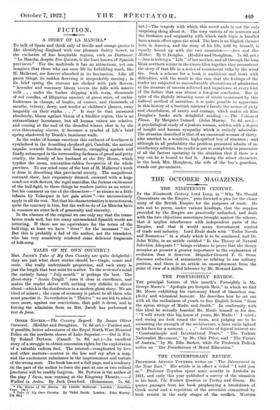FICTION.
A STORY OF LA MANCHA.*
To talk of Spain and think only of Seville and orange-groves is like identifying England with our pleasant Surrey bower, to the exclusion of less hospitable regions, such as Dartmoor. "La Mancha, despite Don Quixote, is the least known of Spanish provinces." For the multitude it has no attractions, yet one imagines that those who can once lift its forbidding mask, like M. Mallarme, are forever absorbed in its fascination. Like all gaunt things, its sudden flowering is unspeakably moving ; in its brief spring the streams are choked with pale flowers, "lavender and rosemary bloom covers the hills with mauve veils. . . under the bushes dripping with resin, thousands of red corollas, of lilliputian narcissi, of green stars, of orchis- foolstones in clumps, of bugles, of crosses, and thousands of mouths, velvety, dewy, and tender as children's glances, sway languidly on their stalks.. . ." It may be that measured absolutely, bloom against bloom of a kindlier region, this is no extraordinary luxuriance, but all human values are relative, and coming at the end of the dreadful winter, shut in by the ever-threatening sierras, it becomes a symbol of Life's brief spring shadowed by Death's imminent walls.
In the realm of human emotions this outburst of loveliness is symbolised in the foundling shepherd girl, Candida, the natural impulse towards freedom and beauty, struggling against and finally submerged in the surrounding darkness of greed and petty cruelty, the family of her husband at the Dry House, which typifies the mean, convention-ridden bourgeoisie of the whole province. To our mind some of the best of M. Mallarme's work is done in describing this provincial society. The magnificent outward show, hair exquisitely dressed, crowned with a huge comb set with flowers, the regal mantillas, the furious excitement of the bull-fight, to these things he renders justice as an artist ; but his comment on one of the characters—" as simian as a little infanta by Velasquez in her gala attire "—we unconsciously apply to all the rest. Not that his characterisation is monotonous, quite the contrary is true, but the well-to-do of La Mancha have in common an utter lack of generosity and sincerity.
In the absence of the original we can only say that the trans- lation reads well, but too many untransiated Spanish words are irritating. If there are no equivalents for the terms of the bull-ring, at least we have " river " for the incessant " rio." But this is probably a fad of the author, not the translator, who has very sensitively rendered some delicious fragments of folk-song.






































 Previous page
Previous page